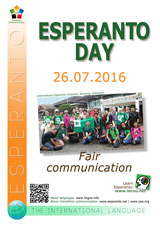
La suba teksto estas sugesto nepre adaptebla al lokaj cirkonstancoj. Modifu, resumu, aŭ riĉigu ĝin laŭ via neceso, kaj sendu ĝin al la gazetaro de via regiono.

Dear Editor <Editorís name>
Somone from our area will soon be debating with representatives of a range of countries in Slovakia about social justice and linguistic justice!
<NAME> from <OUR-TOWN> will take part in this yearís international congress with over 1,200 participants from 60 countries (1) in which <SHE / HE> will not need interpreters. <NAME> is going to the Slovak town of Nitra, where the 101st World Congress of Esperanto will take place from the 23rd to the 30th of July 2016.
Theme of the congress
The theme of this most significant international congress of nations, which takes place entirely in Esperanto every year in a different country, is: "Social justice - linguistic justice". For one week <OUR-local respresentative> willdebate this subject. "It will certainly be very interesting to explore solutions to the social and linguistic injustices of mankind, with representatives of so many nations, without communication difficulties, and discuss so many different proposals and opinions regarding this very current and urgent problem which needs a solution" - <SHE / HE> says.
What is Esperanto
The 129-year-old international language, Esperanto is spoken in more than 120 countries and is used for communication between peoples. It is ethnically neutral and not attached to imperialist, economic or political interests. In addition, because of its ease and regular grammar, it quickly opens the doors of the world to linguistically less talented people as well.
Languages are disappearing
According to UNESCO half of the more than 6,000 languages in the world will disappear before the end of this century (2).
Why this is a problem
In addition to the social injustice that occurs when one's mother tongue is despised, it is necessary to be aware of the fact that biological and linguistic diversity are inseparable, interconnected, and dependent on one another. The result of a loss of linguistic diversity is a loss of traditional knowledge essentially necessary for sustainable biodiversity, for life. (Final declaration, 64th NGO conference, Bonn, 2011 (3); and Terralingua (4))
"When a language dies, we lose a huge intellectual wealth, as if a bomb had exploded in the Louvre museum." (Ken Hale, American linguist)
Why Esperanto is a possible solution
The neutral language Esperanto is a true safeguard for national cultures against the monopolistic influence of just one or two languages, and today this is more and more evident.
Esperanto speakers do not want to make any language disappear; they want all languages to continue to exist, respecting everyone's linguistic rights and linguistic justice to prevail in international communication. Behind Esperanto are no states, economic systems, imperialist designs, nor peoples, whose interest would be the disappearance of other peoples, their languages, and the acquisition of their markets. Behind Esperantothere are just people of goodwill who are seeking justice for all cultures and all languages, and peace among the nations.
UNESCO has already acknowledged Esperanto by two resolutions (1954 (5) 1985 (6)) and will be associated in 2017 to the celebration of the 100th anniversary of the death of L.L.Zamenhof, creator of the international language, Esperanto. The Universal Esperanto Association (UEA) is in official relations with UNESCO and the United Nations (UN)
Esperanto Day
 Moreover,
on 26 July, the participants of the congress and Esperanto speakers all over the
world will celebrate Esperanto Day, on which, 129 years ago, the first textbook
of the international language was published. This anniversary underscores the
value at the heart of the Esperanto movement: striving for linguistic justice in
the world (7).
Moreover,
on 26 July, the participants of the congress and Esperanto speakers all over the
world will celebrate Esperanto Day, on which, 129 years ago, the first textbook
of the international language was published. This anniversary underscores the
value at the heart of the Esperanto movement: striving for linguistic justice in
the world (7).
Facts about Esperanto
Esperanto is a living language, more than 212,000 people learn it through the website "Lernu" (8), 422,000 with "Duolingo" (9) and other thousands attend courses throughout the world.
It is a language with a rich culture. The online encyclopedia Wikipedia (10), currently contains 229,000 articles in Esperanto, and is the second most important group of languages, those with more than a hundred thousand items. The Austrian National Library (11) has more than 35,000 titles of books, translated into or originally written in Esperanto. In the Municipal Library of La Chaux-de-Fonds, Switzerland, the CDELI archive (12) has more than 30,000 books and various periodicals in and about Esperanto and interlinguistics. The catalogue of the Universal Esperanto Association (13) has almost 7,000 books (and discs, videos, etc.) for sale.
Several radio stations (online or analogue) and several television channels broadcast in Esperanto (14). Esperanto speakers have created a growing, vibrant market of English music (15).
Contacts
<NAME>
<Address>
<Tel. ...>
[Preferably mobile / cellphone - at least as well, because more often accessible]
<Email address>
<Website of country, regional, or municipal association>
References:
www.gazetaro.org/2016/referencoj.htm
tradukita kaj adaptita de Hilary Chapman